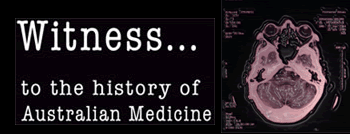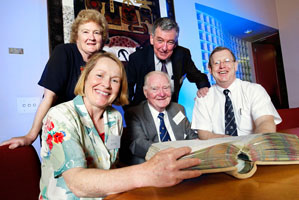


A chapter in the evolution of paediatrics in Australia
Introduction
Participants
Origins of the Department
Early developments
Leadership
New directions in patient care, research and teaching
Ethical issues in research and treatment
Formalising the research effort
Training Programs
Surgical research and training
Finding funds for research
Establishing sub-specialty departments
More on medical education
Academic outreach
Endnotes
Index
Search
Help
Contact us

Don Kinsey[40]: Can I just mention, I was outside the Hospital then, I was in the media. But I remember every Good Friday [Appeal], stories used to come down from the Hospital. And in subsequent years, when I came to work at the hospital, through talking to people and reading about the Hospital, I think Kester has hit the nail right on the head. Both were very fine clinicians and Howard, particularly, a great researcher. But the word “politics” came into what Kester said. And from what I read and heard and understood at the time, and from my own relationships with him too, Vernon was the man who was a little more politically aware, and knew how to use the system to achieve the best results. That's not to decry the way Howard used to do things. But Vernon had perhaps a vision. As someone once said to me, some people can see the horizon. That’s fine, but the true visionary sees over the horizon.
Bernard Neal: We don't want to go too far into the Collins/Williams thing because there are many personal undertones and conflicts and so forth. I think they both had great mutual respect and they were both greatly respected by those who worked with them. Naturally enough they had different personality traits. And I would agree entirely with what’s been said. The word that comes to my mind is diplomacy. If there was something needed doing, Vernon had a surer diplomatic way to go about it, although the cause and views were held just as strongly by Vernon Collins and Howard Williams. If you had to seek a representative, in my view, Vernon had more natural skills.
Peter Phelan: I came to the Children's in 1965 and worked closely with Howard until he retired. In '75 I got to know Vernon very well. I have no doubt that the correct appointment was made. I don’t think Howard had the skills in the area that Vernon had [them] to get the University Department [of Paediatrics] established. That’s in no way to downplay Howard. His abilities were extraordinary but they were different. So I think the right decision was made. But Howard’s students would have known his great disappointment at not being appointed. I’m sure June [McMullin (Danks)] would have heard the same things from Howard over the years.
June McMullin (Danks): I think Howard was disappointed that he wasn't recognised for his abilities. The right decision was made in appointing Vernon Collins - he was a wonderful administrator and organiser, and he had an outward-going personality. But Howard was the thoughtful one. I believe Lady Latham played an important part in the appointment of Vernon Collins, as well as in the issue of salaried medical staff, a system that was introduced at the Children’s Hospital before it was considered elsewhere [in Victoria].[41]
Ann Westmore: Lady Latham played a part in the appointment?
Bernard Neal: In my opinion Lady Latham backed Vernon, possibly influenced by Vernon Collins' diplomacy.

Witness participants examine an early 1950s book of ward reports from the Royal Children's Hospital. From left (back), Professor Ruth Bishop (honorary member of the University Department of Paediatrics), Emeritus Professor Peter Phelan (former head of Department) and foreground, Dr Ann Westmore, Dr Winston Richards (former member of Department) and Professor Glenn Bowes (current head of Department).
PHOTO: © Peter Casamento
 |
Witness to the History of Australian Medicine |  |
© The University of Melbourne 2005-16
Published by eScholarship Research Centre, using the Web Academic Resource Publisher
http://witness.esrc.unimelb.edu.au/009.html